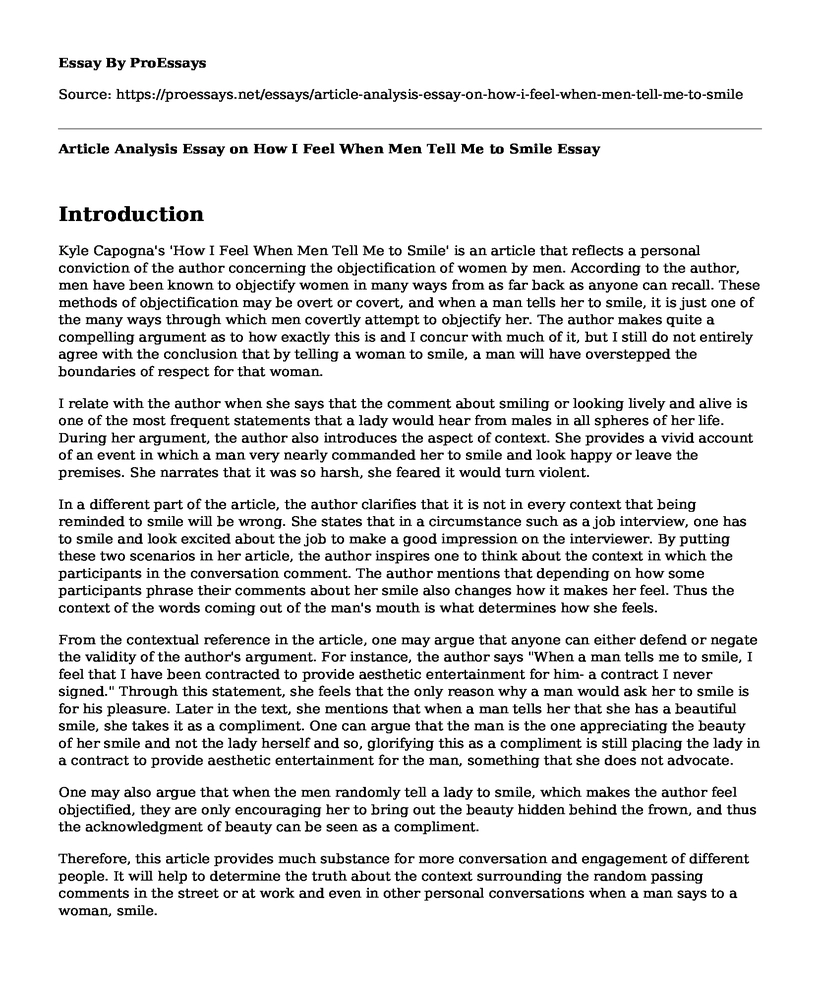Introduction
Kyle Capogna's 'How I Feel When Men Tell Me to Smile' is an article that reflects a personal conviction of the author concerning the objectification of women by men. According to the author, men have been known to objectify women in many ways from as far back as anyone can recall. These methods of objectification may be overt or covert, and when a man tells her to smile, it is just one of the many ways through which men covertly attempt to objectify her. The author makes quite a compelling argument as to how exactly this is and I concur with much of it, but I still do not entirely agree with the conclusion that by telling a woman to smile, a man will have overstepped the boundaries of respect for that woman.
I relate with the author when she says that the comment about smiling or looking lively and alive is one of the most frequent statements that a lady would hear from males in all spheres of her life. During her argument, the author also introduces the aspect of context. She provides a vivid account of an event in which a man very nearly commanded her to smile and look happy or leave the premises. She narrates that it was so harsh, she feared it would turn violent.
In a different part of the article, the author clarifies that it is not in every context that being reminded to smile will be wrong. She states that in a circumstance such as a job interview, one has to smile and look excited about the job to make a good impression on the interviewer. By putting these two scenarios in her article, the author inspires one to think about the context in which the participants in the conversation comment. The author mentions that depending on how some participants phrase their comments about her smile also changes how it makes her feel. Thus the context of the words coming out of the man's mouth is what determines how she feels.
From the contextual reference in the article, one may argue that anyone can either defend or negate the validity of the author's argument. For instance, the author says "When a man tells me to smile, I feel that I have been contracted to provide aesthetic entertainment for him- a contract I never signed." Through this statement, she feels that the only reason why a man would ask her to smile is for his pleasure. Later in the text, she mentions that when a man tells her that she has a beautiful smile, she takes it as a compliment. One can argue that the man is the one appreciating the beauty of her smile and not the lady herself and so, glorifying this as a compliment is still placing the lady in a contract to provide aesthetic entertainment for the man, something that she does not advocate.
One may also argue that when the men randomly tell a lady to smile, which makes the author feel objectified, they are only encouraging her to bring out the beauty hidden behind the frown, and thus the acknowledgment of beauty can be seen as a compliment.
Therefore, this article provides much substance for more conversation and engagement of different people. It will help to determine the truth about the context surrounding the random passing comments in the street or at work and even in other personal conversations when a man says to a woman, smile.
Cite this page
Article Analysis Essay on How I Feel When Men Tell Me to Smile. (2022, Nov 29). Retrieved from https://proessays.net/essays/article-analysis-essay-on-how-i-feel-when-men-tell-me-to-smile
If you are the original author of this essay and no longer wish to have it published on the ProEssays website, please click below to request its removal:
- We Should Adopt the 100 Hours Community Service - Essay Sample
- Domestic Violence and the Minority Woman Essay Example
- Speech Analysis Essay on Sen. Booker Inspirational Speech
- Culture: Impact on Communication & Interpersonal Skills - Essay Sample
- Paper Example on Bullying: A Growing Scourge in Society
- God's Unconditional Love: Marriage & Homosexuality in Christian Perspective - Essay Sample
- Essay Sample on Doing Business in Panama: Culture, Exchange Rate & More







